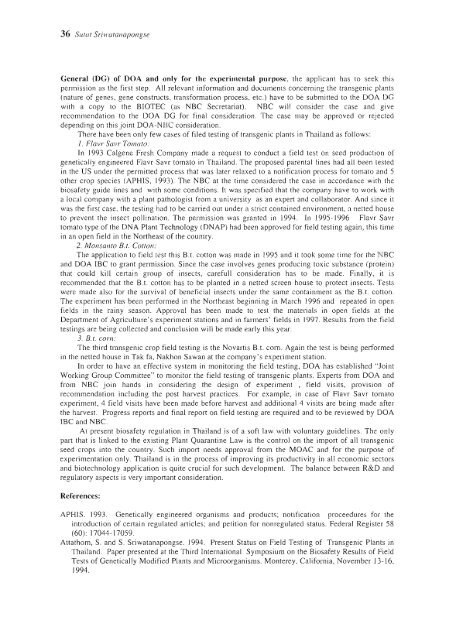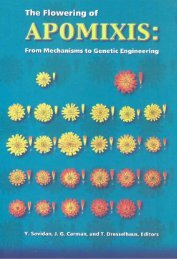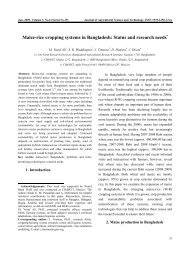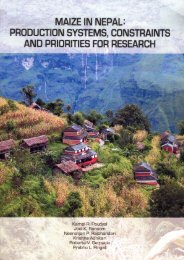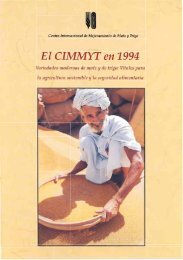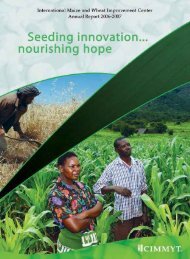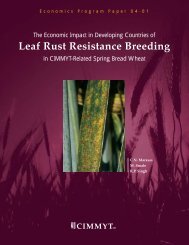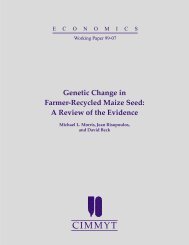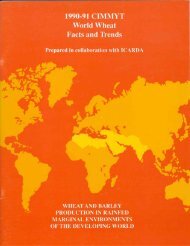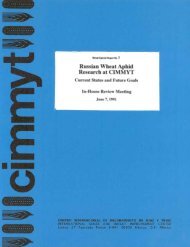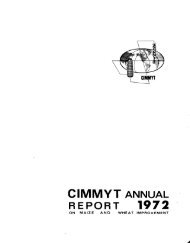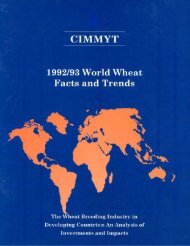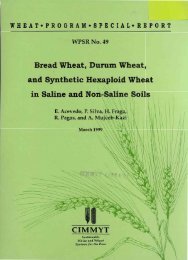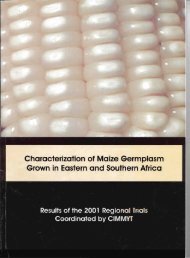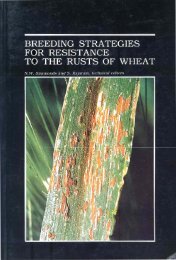- Page 2 and 3: Proceedings of the Seventh Asianegi
- Page 4 and 5: ~ . .r .
- Page 6 and 7: IV92 Governmental Support for Resea
- Page 8 and 9: VI38 J Responses of Open-Pollinated
- Page 10 and 11: VllJ611 Hybrid ancl New Bioscience
- Page 12 and 13: xFOREWORDThe regional maize worksho
- Page 14 and 15: 2 Timothy Reevescan differ from fie
- Page 16 and 17: 4 Timorhv Reeveseveryone must be a
- Page 18 and 19: 6 Tilllothy Reel'esand less land an
- Page 20 and 21: 8 Timothy Reevesparticipatory resea
- Page 22 and 23: 10 Timothv Reeves1997). Diagnostic
- Page 24 and 25: 12 Timothy Reevesand this is anothe
- Page 26 and 27: 14 Timolh.v Ree\'esInformation tech
- Page 28 and 29: 16 Timothy ReevesHarrington, L., R.
- Page 30 and 31: The Asian Economic Crisis: Implicat
- Page 32 and 33: 20 Phabhu Pingaliinvestments. Prior
- Page 34 and 35: 22 Phabhu Pillga/icosts in the shor
- Page 36 and 37: 24 David Hoisingtonincreasing rapid
- Page 38 and 39: 26 David Hoisingtonlines derived vi
- Page 40 and 41: 28 David Hoisingtoneffective breedi
- Page 42 and 43: Issues of Intellectual Property Rig
- Page 44 and 45: 32 SmaJ SrilVatmrapongsepoor farmer
- Page 46 and 47: 34 Swat SriwatanapongseI. The paten
- Page 50 and 51: Role of Networking for Strengthenin
- Page 52 and 53: 40 R.S Parada//1. Mai-r.e Research
- Page 54 and 55: 42 R.S. Parodainfonnation exchange
- Page 56 and 57: 44 R.S. Pamdathe network.VI. Networ
- Page 58 and 59: 46 R.S. ParodaVIII. EpiloglleOne ca
- Page 60 and 61: 48 Zhou Darong, He Kanglai and Song
- Page 62 and 63: 50 Zhou Dorong, He Kong/ai and Song
- Page 64 and 65: 52 ZllOll Darollg, He KallK/ai alld
- Page 66 and 67: S4 Zho/l Darong, He Kanglai and Son
- Page 68 and 69: 56 ZhOll Darong, He Kanglai and Son
- Page 70 and 71: Hybrid Maize Technology : Challenge
- Page 72 and 73: 60 S.K. Vasalreplace OPYs and some
- Page 74 and 75: 62 S.K. Vasalactivities one should
- Page 76 and 77: 64 Shil'aji PandeyAsia (Table 3). T
- Page 78 and 79: 66 Shil'aji Pandey4. Fewer and fewe
- Page 80 and 81: 68 Shivoji PandeyClosing4. We must
- Page 82 and 83: Maize Research in the Public Sector
- Page 84 and 85: 72 N.N. Singhprivate sector. With t
- Page 86 and 87: 74 N.N. Singhresearch programmes to
- Page 88 and 89: 76 NN SinghThe picture of one inter
- Page 90 and 91: Public and Private Partnership in H
- Page 92 and 93: 80 Weerachai 5., Taweesak P., Tawut
- Page 94 and 95: Supporting the Hybrid Maize Breedin
- Page 96 and 97: 84 Chokechai A., Sansem 1. Chamipom
- Page 98 and 99:
86 Chokechai A., Sansern 1. Chamipo
- Page 100 and 101:
88 Chokeclrai A., Sansern 1. Chamip
- Page 102 and 103:
Table 5.Mean grain yields, regressi
- Page 104 and 105:
Governmental Support for Research a
- Page 106 and 107:
94 Trail HOllg Uy3. Guidelines give
- Page 108 and 109:
Maize Hybrid Breeding for Subtropic
- Page 110 and 111:
Table 2.Best Single Crosses Among E
- Page 112 and 113:
100 H. Cordova, S. Castellanos, S.K
- Page 114 and 115:
102 H. Corelom, S. Castellanos, S.K
- Page 116 and 117:
104 H. Cordova, S. Castellanos, S.K
- Page 118 and 119:
106 Shi-hllang Zhang and De-qu{m Sh
- Page 120 and 121:
108 Shi-ililang Zhang and De-quem S
- Page 122 and 123:
110 Shi-huang Zhang and De-quan Slz
- Page 124 and 125:
Table 5.Means of days to silking, P
- Page 126 and 127:
114 Shi-huanf{ Zhang alld De-quan S
- Page 128 and 129:
116 L. W. Kannenbergand thereby the
- Page 130 and 131:
118 L. W. Kannenbergin Hallauer and
- Page 132 and 133:
120 L. W. KannenbergC'4oD.. -1010 r
- Page 134 and 135:
122 D.N. ChaudharyBreeding MethodsT
- Page 136 and 137:
Heterosis in Maize: Groupings and P
- Page 138 and 139:
126 V.K. Saxena, N.S. Malhi, N.N. S
- Page 140 and 141:
128 v.K. Saxena, NS. Malhi, NN Sing
- Page 142 and 143:
130 V.K Saxena, N.S. Malhi, N.N. Si
- Page 144 and 145:
132 VK. Saxena, N.S. Malhi, NN Sing
- Page 146 and 147:
Evaluation, Distribution and U iliz
- Page 148 and 149:
136 Ganesall Srinivasan and S.K. Va
- Page 150 and 151:
138 Ganesan Srinivasan and s.K. Vas
- Page 152 and 153:
140 Ganesan Srinivasan and S.K. Vas
- Page 154 and 155:
142 Canesan Srinivasan and S.K. Vas
- Page 156 and 157:
Recombinant Inbred Lines in Tropica
- Page 158 and 159:
146 JalJ1t'.~ L Bren1J
- Page 160 and 161:
148 James L. Brewbaker and Hyeoll G
- Page 162 and 163:
150 James L. Brewbaker and Hyeoll C
- Page 164 and 165:
DNA Fingerprinting and the Seed Bus
- Page 166 and 167:
154 Apichart Vanavichit and Somvong
- Page 168 and 169:
156 ZhOll Hongshengr maintained----
- Page 170 and 171:
158 Zhou Hongshengprovince in 1990,
- Page 172 and 173:
160 Zhou Hongsheng302515i"~ 10
- Page 174 and 175:
162 Zhou HongshengZhou HS, it ai, 1
- Page 176 and 177:
164 Eduardo C. Fernandez, Samuel C.
- Page 178 and 179:
166 Eduardo C. Fernandez, Samuel C.
- Page 180 and 181:
168 Eduardo C. Fernande::, Samuel C
- Page 182 and 183:
Initial Results of Anther Cultureof
- Page 184 and 185:
172 Bui Hanh Cuong, Tran Hong Uy an
- Page 186 and 187:
Tackling Biodiversity Issues in Hyb
- Page 188 and 189:
176 Chokeclwi Aekalasanawan and S.K
- Page 190 and 191:
178 Chokechai Aekatasanawan and SK.
- Page 192 and 193:
180 Clzokeclzai Aekatasanawan and S
- Page 194 and 195:
182 Chokechai Aekatasanawan and S.K
- Page 196 and 197:
184 Chokechai Aekarasanawan and S.K
- Page 198 and 199:
186 Chokechai Aekatasal1awan and S.
- Page 200 and 201:
The Importance of the Anthesis-Silk
- Page 202 and 203:
190 1. Bolanos alld G.O. EdmeadesMa
- Page 204 and 205:
192 1. Bolanos and G. O. Edmeadesfr
- Page 206 and 207:
194 1. Bolanos and G.o. Edllleadesw
- Page 208 and 209:
196 1. Bolanos and ;.0. Edmeadesthi
- Page 210 and 211:
198 1. Bolanos and G.O. EdmeadesBlu
- Page 212 and 213:
200 1. Bolanos and G.O. EdmeadesFig
- Page 214 and 215:
202 1. Bolanos and G.O. Edll2eadesB
- Page 216 and 217:
204 1. Bolanos and G.O. EdmeadesTab
- Page 218 and 219:
Table 5 Genetic correlations (r g )
- Page 220 and 221:
208 M. Ball;;eger, H.R. Lafilfe, G.
- Page 222 and 223:
210 M. Banzeger, H.R. Lafitte, G.O.
- Page 224 and 225:
212 M. Banz.eger. H.R. Lafitte, G.O
- Page 226 and 227:
214 tv!. Banzeger, H.R. Lafitte, G.
- Page 228 and 229:
216 M. Banzeger, H.R. Lafitte, G.O.
- Page 230 and 231:
Progress in Breeding for Low Nitrog
- Page 232 and 233:
220 y. Chal1fac!lume, P. Krudlowna,
- Page 234 and 235:
222 Y. Clzan{{/chume, P. Krudloyma,
- Page 236 and 237:
224 Y. Chantachume, P. Krudloyma, S
- Page 238 and 239:
226 Y. Chantachume, P. Krudloyma, S
- Page 240 and 241:
228 Y. Chantachume, P. Krudloyl11a,
- Page 242 and 243:
230 Y. Chafltachume, P. Krudloyma,
- Page 244 and 245:
Production of Maize Under Excess SO
- Page 246 and 247:
234 T.R. Rathore, M.Z.K Warsi, N.N.
- Page 248 and 249:
236 T.R. RatllOre, M.Z.K. Warsi, N.
- Page 250 and 251:
238 T.R. Rathore, M.z.K. Warsi, N.N
- Page 252 and 253:
Development of Acid Soil Tolerant M
- Page 254 and 255:
242 Carlos De Leon, Shivaji Pandey
- Page 256 and 257:
244 Carlos De Leon, Shivaji Pandey
- Page 258 and 259:
246 Carras De Leon, Slzivaji Pandey
- Page 260 and 261:
248 Carlos De Leo/!, Shivaji Pandey
- Page 262 and 263:
250 SK. Vasal, S. Pandey, M. Barand
- Page 264 and 265:
252 S.K. Vasal, S. Pandey. M. Baran
- Page 266 and 267:
254 s.K. Vasal, S. Pandey, M. Baran
- Page 268 and 269:
256 S.K. Vasal, S. Pandey, M. Barml
- Page 270 and 271:
258 D. leffel's, H. Cordova, S. Vas
- Page 272 and 273:
260 D. Jeffers, H. Cordova. S. Vasa
- Page 274 and 275:
262 D. leffel's, H. Cordol'a, S. Va
- Page 276 and 277:
264 D. Jeffers. H. CordOl'a, S. Vas
- Page 278 and 279:
266 D. Jeffers, H. Cordova, S. Vasa
- Page 280 and 281:
268 Samuel C. DalmacioViral Disease
- Page 282 and 283:
270 Samuel C. Dalmacioexplored. Oth
- Page 284 and 285:
272 Samuel C. Dalmacio(Helminthospo
- Page 286 and 287:
274 Samuef C. Daflllacioimportant r
- Page 288 and 289:
276 Samuel C. DalmacioPayne, G.A. 1
- Page 290 and 291:
278 AI'e/ino D. Raymundoand Rajasth
- Page 292 and 293:
280 Avelino D. RaymundoStatus of Br
- Page 294 and 295:
282 Avelino D. RaymundoBaria, A R.
- Page 296 and 297:
Banded Leaf and Sheath Blight of Ma
- Page 298 and 299:
286 R.C. Sharma, Carlos De Leon all
- Page 300 and 301:
288 R.C. Sharma, Carlos De Leon and
- Page 302 and 303:
Maize Stalk Rot Complexes: Innovati
- Page 304 and 305:
292 Samgam Lal. Carlos De Leon. v,K
- Page 306 and 307:
294 Samgalll La!, Carlos De Leon, V
- Page 308 and 309:
296 Samgam Lal. Carlos De Leoll. VK
- Page 310 and 311:
298 Samgam Lal, Carlos De Leon, V.K
- Page 312 and 313:
300 Samgam Lal, Carlos De Leon, v.K
- Page 314 and 315:
302 Salllgal/1 La I, Carlos De Leol
- Page 316 and 317:
304 Samgam Lal, Carlos De Leon, v.K
- Page 318 and 319:
306 Samgam Lal, Carlos De Leon, v.K
- Page 320 and 321:
308 Carlos De Leol!Table 2 describe
- Page 322 and 323:
310 Car/os De Leon3. RhabdovirusThi
- Page 324 and 325:
312 Carlos De Leon7.6. The techniqu
- Page 326 and 327:
Current Status of Breeding Maize Ge
- Page 328 and 329:
316 D. Bergvinson, D. Beck, F. Betr
- Page 330 and 331:
318 D. Bergl'illson, D. Beck, F. Be
- Page 332 and 333:
320 D. Bergvillsoll, D. Beck, F. Be
- Page 335 and 336:
Breeding Maize Germplasm Tolerant {
- Page 337 and 338:
Status of Breeding Maize Germplasms
- Page 339 and 340:
Breeding Mai-;.e Germplasm Tolerant
- Page 341 and 342:
Breeding Maize Germplasm Tolerant t
- Page 343 and 344:
Breeding Maize Germplasm Tolerant t
- Page 345 and 346:
Breeding Maize Germplasm Tolerant t
- Page 347 and 348:
Breeding Mai::.e Germplasm Tolerant
- Page 349 and 350:
Breeding Maize Germprasm Torerant t
- Page 351 and 352:
Use of Trichogramma ostriniae Hymen
- Page 353 and 354:
TricflOgmmma to Control the Asian C
- Page 355 and 356:
Trichogramma fa Confrol fhe Asian C
- Page 357 and 358:
Trichogramma to Control the Asian C
- Page 359 and 360:
-'d14.8b I 0.8aPercent I No.damag
- Page 361 and 362:
Trichogramma to Control the Asian C
- Page 363 and 364:
Trichogramma to ConTrol the Asian C
- Page 365 and 366:
Tric1lOgrwnma to CO/ltrol the Asian
- Page 367 and 368:
TricllOgralllll/.G to Control the A
- Page 369 and 370:
Pests and Diseases of Maize in Indo
- Page 371 and 372:
Pests and Diseases ofMaize in Indon
- Page 373 and 374:
Pests and Diseases ofMai::.e in Ind
- Page 375 and 376:
Pests and Diseases ofMaize in Indon
- Page 377 and 378:
Pests and Diseases a/Maize in Indon
- Page 379 and 380:
Maize Stem Borers in India and Thei
- Page 381 and 382:
Maize Stem Borers in India 369enemi
- Page 383 and 384:
Maize Stem Borers in India 371• C
- Page 385 and 386:
Sustainable Corn Prod cHon under Al
- Page 387 and 388:
Sustainable Corn Production 011 Slo
- Page 389 and 390:
Sustainable Corn Production on Slop
- Page 391 and 392:
Sustainable Com Production on Slopi
- Page 393 and 394:
Responses of Open-Pollinated and Hy
- Page 395 and 396:
Open-Pollinated and Hybrid Mai;:e C
- Page 397 and 398:
Fertilization and Nutrient Manageme
- Page 399 and 400:
Nutrient Management for Maiz.e Crop
- Page 401 and 402:
Nutrient Management for Mai::e Crop
- Page 403 and 404:
Nutrient Managementfor Maize Croppi
- Page 405 and 406:
Nutrient Management for Maize Cropp
- Page 407 and 408:
Nutrient Management/or Maize Croppi
- Page 409 and 410:
Nutrient Managementfor Maize Croppi
- Page 411 and 412:
Maize Cultivation in Paddy Field Re
- Page 413 and 414:
Maize Cultivation in Paddy Field Re
- Page 415 and 416:
Maize Cultivation in Paddy Field Re
- Page 417 and 418:
Mai::.e Cultiwllion i/7 Paddy Field
- Page 419 and 420:
Maize-Based Cropping Systems in the
- Page 421 and 422:
Mai::.e Based Cropping Svstems in t
- Page 423 and 424:
Mai.-e Based Cropping Systems ill t
- Page 425 and 426:
Maize Based Cropping Systems in the
- Page 427 and 428:
Maize Based Cropping Systems in the
- Page 429 and 430:
Maize Based Cropping Systems in the
- Page 431 and 432:
Maize Based Cropping Systems in the
- Page 433 and 434:
J'vtaize Based Cropping Syslems ill
- Page 435 and 436:
Effects of Ecological Conditions an
- Page 437 and 438:
Winter Maiz.e Of! Wetland in the Cr
- Page 439 and 440:
Winter Mai~e on Wetland in the Crop
- Page 441 and 442:
Winter Maize on Wetland in the Crop
- Page 443 and 444:
Winter Maize 431IntroductionIn a br
- Page 445 and 446:
Willler Mai::.e 433applied fertiliz
- Page 447 and 448:
Technics for Corn Production in Sou
- Page 449 and 450:
Technics for Corn Prodllction in SO
- Page 451 and 452:
Technics for Corn Production ;n Sou
- Page 453 and 454:
Technicsfor Com Production in South
- Page 455 and 456:
Technics for Corn Production in Sou
- Page 457 and 458:
Adm/Jces in Breeding Specially Mai;
- Page 459 and 460:
Adval/ces in Breeding Specialty Mai
- Page 461 and 462:
Advances in Breeding Specialty !v1a
- Page 463 and 464:
QPM Breeding Pro ram in ChinaShi-hu
- Page 465 and 466:
QPM Breedillg Program ill China 453
- Page 467 and 468:
QPM Breeding Program in China 455Li
- Page 469 and 470:
QPM Breeding Program in China 457Ta
- Page 471 and 472:
Forage Corn: Emerging Use of Maize
- Page 473 and 474:
Forageortl 461Structural Changl's i
- Page 475 and 476:
Forage Com 463plant population of 8
- Page 477 and 478:
Forage Corn 4652. For material that
- Page 479 and 480:
Forage Com 467Table 5.Importation o
- Page 481 and 482:
Forage Com 469Table 8. Computed yie
- Page 483 and 484:
Breeding of Maize for the Baby Corn
- Page 485 and 486:
Maize for the Baby Corn Consumer Ma
- Page 487 and 488:
Maize Production and Research in Ch
- Page 489 and 490:
Maize Production and Research in Ch
- Page 491 and 492:
Mai-::.e Production and Research in
- Page 493 and 494:
Maize Production and Research in Ch
- Page 495 and 496:
Progress a/Maiz.e Research in India
- Page 497 and 498:
Progress ajMaize Research in India
- Page 499 and 500:
Progress ofMaize Research in India
- Page 501 and 502:
Progress ofMai::e Research in India
- Page 503 and 504:
Maize Research and Development in I
- Page 505 and 506:
Mai::;e Research and Development in
- Page 507 and 508:
Mai::e Research and Development in
- Page 509 and 510:
Mai::.e Research and Del'elopment i
- Page 511 and 512:
Maize Research and Development in I
- Page 513 and 514:
Maize Research and Development in I
- Page 515 and 516:
Country Report on Highlights of Pro
- Page 517 and 518:
Maize Research in the Philippines 5
- Page 519 and 520:
Alai;..: R< s('arch ill rh(' Plzili
- Page 521 and 522:
Progress in Maize Research in Thail
- Page 523 and 524:
Progress in Maize Research in Thail
- Page 525 and 526:
Progress ill Maize Research in Thai
- Page 527 and 528:
lrl~lrl~..§'(3,.:::E--;.:;:-s:::l:
- Page 529 and 530:
Progress in Maize Research in Thail
- Page 531 and 532:
0\ITl '""'Table 8.Mean grain yield
- Page 533 and 534:
Progress in Maize Research in Thai/
- Page 535 and 536:
Progress of Maize Breeding in Vietn
- Page 537 and 538:
Progress ofMai-:.e Breeding in Viet
- Page 539 and 540:
Progress ofMaize Breeding in Vietna
- Page 541 and 542:
Progress ofMaize Breeding in Vietna
- Page 543 and 544:
Progress ofMaize Breeding in Vietna
- Page 545 and 546:
~-Progress ofMaize Breeding in Viet
- Page 547 and 548:
Maize Research in Nepal 5351. Area,
- Page 549 and 550:
Maize Research in Nepal 537Present
- Page 551 and 552:
Maize Research in Nepal 539Local co
- Page 553 and 554:
Maize Research in Nepal 541Patholog
- Page 555 and 556:
Maize Research ill Nepal 5 3Chemica
- Page 557 and 558:
Maize Research ill Nepal 545Maize b
- Page 559 and 560:
Maize Research in Nepal 547Table 12
- Page 561 and 562:
Maize Research in Nepal 549Research
- Page 563 and 564:
Maize Research in Nepal 551Acknowle
- Page 565 and 566:
Maize Research in PakistanMohammad
- Page 567 and 568:
Maize Research in Nepal 555There ha
- Page 569 and 570:
Maize Research in Nepal 557Shift In
- Page 571 and 572:
Maize Research in Nepal 559Average
- Page 573 and 574:
Present Status and Strategies for D
- Page 575 and 576:
Maize Production in Sri Lanka 563in
- Page 577 and 578:
Maize Production in Sri Lanka 565At
- Page 579 and 580:
Maize Production in Sri Lanka 567rt
- Page 581 and 582:
Mai~e Research in Bangladesh 569Str
- Page 583 and 584:
Maize Research ill Bangladesh 571Su
- Page 585 and 586:
Mai::.e Research in Bangladesh 573R
- Page 587 and 588:
Current Status of Maize in MyanmarT
- Page 589 and 590:
Current Status ofMaize in Myanmar 5
- Page 591 and 592:
Seed Production ofMaize in India 57
- Page 593 and 594:
Seed Production ofMaize in India 58
- Page 595 and 596:
Seed Production ofMaize in India 58
- Page 597 and 598:
Seed Production ofMaize in India 58
- Page 599 and 600:
Breeding Maize for North-Western In
- Page 601 and 602:
Breeding Mai-;e for North- Western
- Page 603 and 604:
,..,Q\IT)t:::5'\l~- 2:l~..::;E:~';:
- Page 605 and 606:
Cargill's Maize Breeding Research i
- Page 607 and 608:
Cargill's lv/aize Breeding Research
- Page 609 and 610:
Maize Research Progranl in Mahyco 5
- Page 611 and 612:
IIHybrid Corn Seed Production - Exp
- Page 613 and 614:
Hybrid Corn Seed Production 601Tabl
- Page 615 and 616:
Hybrid Corn Seed Production 603woul
- Page 617 and 618:
Breeding Maize Hybrids in Commercia
- Page 619 and 620:
Summary and Conclusion of Session o
- Page 621 and 622:
Summary Inaugural Session 609hybrid
- Page 623 and 624:
Summary and Conclusion of Session o
- Page 625 and 626:
SUDlmary and Conclusion of Session
- Page 627 and 628:
S mmary and Conclusion of Session o
- Page 629 and 630:
Summary and Conclusion of Session o
- Page 631 and 632:
Summary Speciality Corns Session 61
- Page 633 and 634:
Summary and Conclusion of Session o
- Page 635 and 636:
SummaJy Country and Seed Industry S
- Page 637 and 638:
Questions and Answers 625Q: How muc
- Page 639 and 640:
Questions and Answers 627for MAS, t
- Page 641 and 642:
Questions and Answers 629Q: Does th
- Page 643 and 644:
Questions and Answers 631A: Yes, ea
- Page 645 and 646:
Questions and Answers 633Q: Search
- Page 647 and 648:
Questions and Answers 635considerab
- Page 649 and 650:
Questions alld Answers 637Comment:
- Page 651 and 652:
List ofParticipants 639COLOMBIACarl
- Page 653 and 654:
List ofParticipants 641Prabhu Pinga
- Page 655 and 656:
List ofParticipants 643Elsa M. Luis
- Page 657 and 658:
List ofParticipants 645Nonito Franj
- Page 659 and 660:
List ofParticipants 647Romeo F. Hec
- Page 661 and 662:
List ofParticipants 649Jose Cagampa
- Page 663 and 664:
List ofParticipants 651Danilo P. Ba


